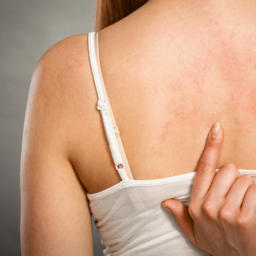
Eczema is no walk in park. It’s an annoying and sometimes painful condition tied to the immune system. It causes inflamed, itchy, cracked, and rough patches of skin all over the body. Eczema affects almost one third of people on the United States – some will outgrow it, but others struggle with outbreaks their entire life.
To add insult to injury, eczema happens in places you might not expect … in the ears, for instance. Ear eczema can be an extremely irritating and at times painful condition. It can range from slight dryness of the outer ear to extensive skin loss and soreness, as well as infection of the external and internal parts of the ear. It can affect the entire ear, including the lobes, the ear opening, canal and the eardrum itself. It is important to focus on prevention and control as if left untreated, eczema or infection can spread outwards to the surrounding skin.
Eczema may appear as a result of exposure to something that causes an allergic reaction. Everyday items can cause outbreaks inside the ears – soaps, gels, earrings, hearing aids, earbuds or even wearing glasses. Objects you might try to use to clean or scratch the ear can also be problematic. Ear piercing does not cause eczema, but can lead to problems when you wear certain types of earrings or studs. If you have a nickel allergy, wear only hypoallergenic jewelry.
It’s always best to consult the doctor if you think you may have eczema in the ears. A professional can give you effective treatment and help to prevent flare‐ups. Treatment of ear eczema will depend on the cause and type, but there are things that you can do at home to prevent outbreak and spread. You can gently wash the inside of your outer ear with water or an emollient wash. You can also use a damp cotton tip very gently in the bowl area of your ear, but do not insert it into the ear canal. Never try to wash further into the ears – you may damage the skin of the ear canal. After washing, dry your ears thoroughly – using a warm (not hot) hair dryer. Avoid scratching the inside of your ears, especially with a foreign object – not only can these damage your ear canal skin or drum, but they can also set up an allergic reaction. The use of ear candles is not advised.
If you go swimming, use ear plugs. You can get custom‐made ear molds to fit your ears. Apply an emollient cream/ointment to treat dry skin around the ears and in the entrance to the ear canals, and refined petroleum oil or sunflower oil for loosening ear wax (but consult first with a healthcare professional first). Using water is not recommended, nor are wax loosening products as they may encourage the buildup of debris and cause more inflammation and irritation.
Ear eczema can be an extremely irritating condition. Since it is difficult to see in the ears without special equipment, it is often hard to know what is going on in there, particularly in the case of young children. If ears become uncomfortable, don’t ignore it – it is always best to see your health care professional and get to the bottom of the itch.